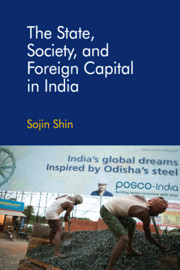Book contents
- Frontmatter
- Dedication
- Contents
- List of Tables, Figures, Illustrations, and Maps
- Acknowledgements
- 1 Introduction
- 2 FDI Inflows in India: Ideas, Interests, and Institutional Change
- 3 FDI Inflows in Tamil Nadu: Inclusionary Ideas, Weakened Interests, and Incremental Institutional Change
- 4 Making FDI Work in Tamil Nadu
- 5 FDI Inflows in Odisha: Weakened Ideas, Strong Interests, and Unstable Institutional Change
- 6 Making FDI Work in Odisha?
- 7 Conclusion
- Bibliography
- Index
7 - Conclusion
Published online by Cambridge University Press: 08 July 2018
- Frontmatter
- Dedication
- Contents
- List of Tables, Figures, Illustrations, and Maps
- Acknowledgements
- 1 Introduction
- 2 FDI Inflows in India: Ideas, Interests, and Institutional Change
- 3 FDI Inflows in Tamil Nadu: Inclusionary Ideas, Weakened Interests, and Incremental Institutional Change
- 4 Making FDI Work in Tamil Nadu
- 5 FDI Inflows in Odisha: Weakened Ideas, Strong Interests, and Unstable Institutional Change
- 6 Making FDI Work in Odisha?
- 7 Conclusion
- Bibliography
- Index
Summary
This book began with an empirical puzzle of how some states in India have facilitated FDI inflows better than others. Building upon the empirical evidence, the book addressed the regional variations of FDI inflows across states in India as a central question. It sought to answer the question by examining the relationships between the state, society, and foreign capital in two select provincial states of India, namely, Tamil Nadu and Odisha. Following an interdisciplinary approach and analysing data collected through fieldwork, it examined the socio–political factors that shaped the disparate levels of FDI inflows into the states. In particular, it emphasised the causal role of differing state–society relations in the evolution of institutions facilitating and regulating FDI inflows in the two states. The primary objective of this book is to understand the significant roles of socio–political factors, such as the ideas and interests of actors in restructuring institutions favouring FDI inflows. Another aim was to explain the dissimilar patterns of such institutional change both at the union and state levels.
Not only at the central government but also in the two states, it was found that the ideas of key policy-makers on the need for foreign capital as important financial resources critically influenced the institutional changes favouring FDI inflows in the process of industrial development. It is worth noting that the year 1967 was a key turning point for Tamil Nadu and Odisha during which regional political parties won the state legislative assembly elections and had a chance to capitalise on citizenship politics. In both states, the financial difficulties of the 1970s helped the state leaders consider foreign investments as significant financial resources. However, such ideas were implemented with a great difference in the two states. In Tamil Nadu, the state agencies playing roles in promoting industrial development and inclusionary policies that were protecting the rights of marginalised citizens developed incrementally throughout the 1970s and 1980s. With regard to state agencies and policies that began involving FDI inflows actively during the post-reform period after 1991, the state of Tamil Nadu was much better prepared than many other states for institutional change favouring FDI inflows. This book highlighted that the nature of inclusionary state–society relationship was a critical source of producing a higher level of FDI inflows in Tamil Nadu.
- Type
- Chapter
- Information
- The State, Society, and Foreign Capital in India , pp. 154 - 164Publisher: Cambridge University PressPrint publication year: 2018



